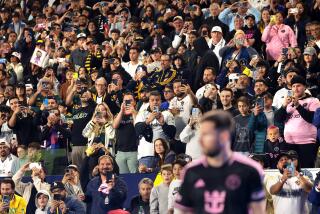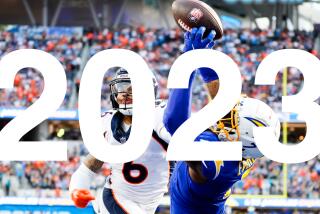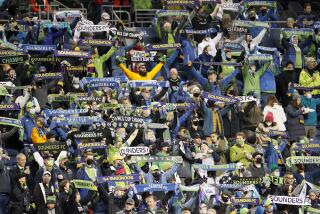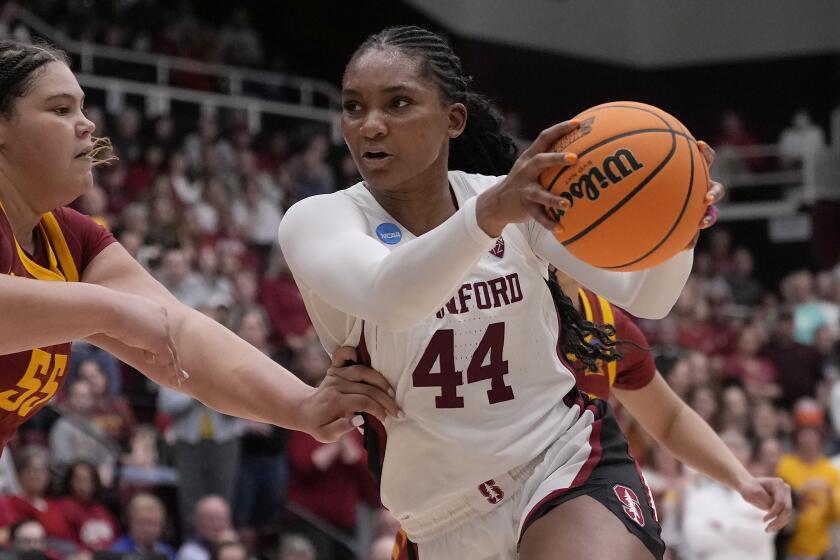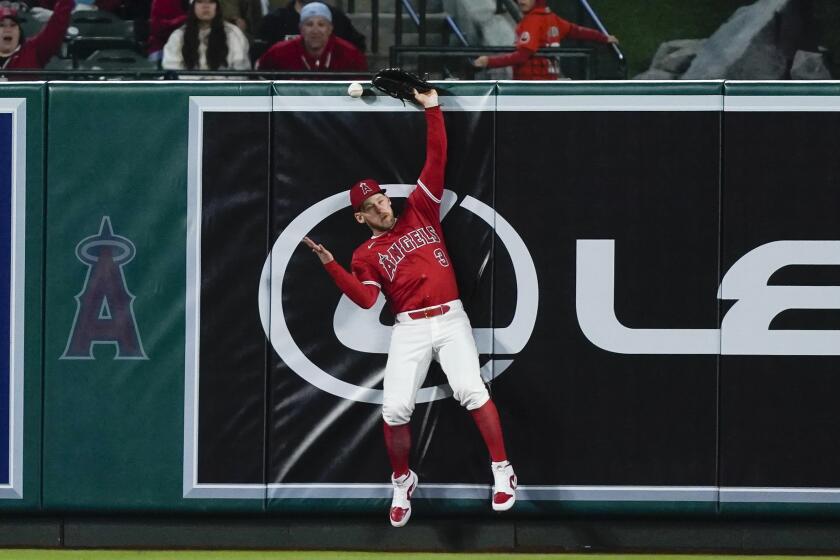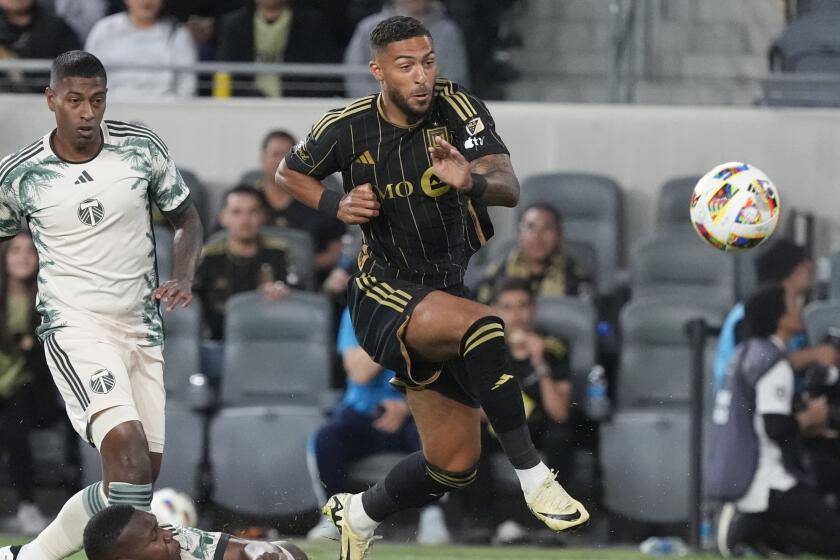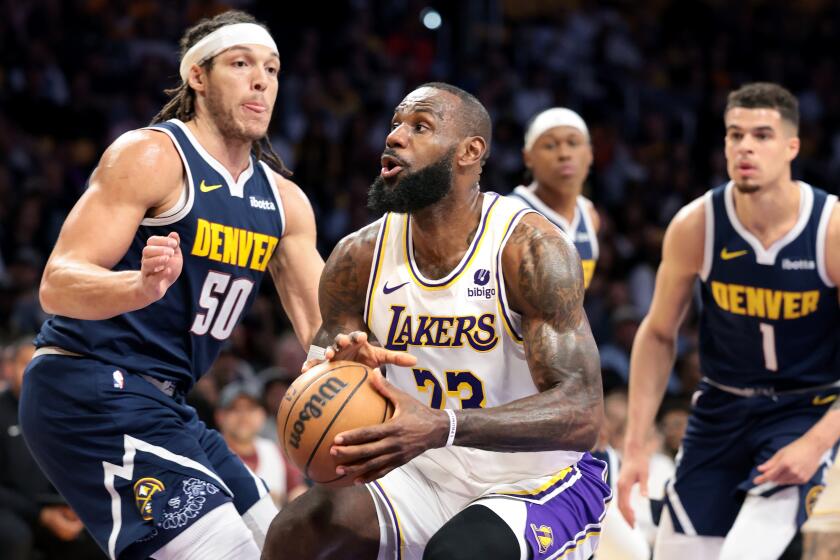Champions League championship brings out a different type of L.A. sports fan
It is noon on a bright Southern California spring afternoon, I am sitting in a Pasadena sports bar with a wide door and large picture windows, yet it is as dark as night.
Yeah, it’s crowded, people in strange, colorful jerseys standing shoulder to shoulder, filling every beer-stained and cheese-crusted corner, covering the windows like human shades, spilling out the door and around pedestrians who recoil in surprise.
I’m sitting with three friends at a small table in the middle of this bar, elbow brushing elbow, close enough that our food and drinks touch, yet we cannot hear one another without shouting.
Yeah, it’s loud, constant noise enveloping us, continuous cheering and moaning and chanting, two hours of New Year’s Eve in May.
To be brutally honest, I didn’t know most of these folks existed. To complete the brutality of my ignorance, I’ve never really understood the enormity of why they were here.
I know now. It’s soccer, stupid. It’s the Champions League championship game between the two greatest club teams in the world. It’s Manchester United against Barcelona in London’s Wembley Stadium in front of an estimated 300 million viewers worldwide.
It’s the Super Bowl with nearly as many people watching. It’s the biggest sports event on the planet in this calendar year. And, as I learned while witnessing Barcelona’s 3-1 victory at Lucky Baldwins Trappiste Pub and Cafe on Saturday, it’s a rare glimpse into a group of Los Angeles sports fans that is as large and passionate as they are hidden.
“Are you new to this game?” asks Barry Matthews, a 31-year-old who noticed my wide eyes while he was being jostled into the side of my table.
I have covered entire World Cups. I have covered MLS title games. I have covered an NCAA national championship game. But I’ve never seen anything like this, a full house of fans cheering for two club teams from two countries as if they were watching the Lakers play the Boston Celtics.
“Um, yes,” I say. “I am new to this game.”
These are soccer fans, but not like the ones who are stereotyped every four years. These aren’t strictly Team USA fans, and are often not Galaxy fans. These are soccer fans who are futbol fans, sophisticated lovers of the game at its highest level, folks who follow the worldwide leagues like many here follow the NFL.
They are smart, and they are serious, and they are nuts. They are the ones who shuffle into local pubs at 5 a.m. on Saturdays to cheer for Arsenal. They are the ones who spend Saturday afternoons watching replays of AC Milan games.
With the increased visibility of foreign soccer here through Internet feeds and cable television, they can follow Manchester United as easily as their neighbors can follow the Dodgers. The only difference is, thousands of Dodgers fans can actually gather at a public facility to watch a game, while futbol fans are usually consigned to small bars and office cubicles.
There are usually only two times when one can easily witness their powerful passion. It happens when European teams visit this country — a couple of years ago, 93,137 filled the Rose Bowl to watch FC Barcelona defeat the Galaxy in an exhibition. And it happens on days like Super Saturday.
“For us, this is much bigger than even the Super Bowl,” says Neale Aslett, the England native who is Lucky’s general manager. “For the 21 years I’ve lived in this country, people have said the USA will become a global power in soccer, and that’s never going to happen, but that has nothing to do with the rise of soccer popularity in the USA — it just keeps getting bigger.”
I am sitting with Bob Buente, a 63-year-old man who discovered the wonders of international soccer five years ago and now follows it like I follow my fantasy baseball team. He complains that Nani should have been in the starting lineup for Manchester. He is surprised at Eric Abidal’s comeback for Barcelona.
All around us, folks are wearing soccer jerseys adorned with names of players that average American sports fans would find strange — Chicharito, Neville, Giggs — yet Buente knows them all like I know the Florida Marlins infield.
“The game is subtle, it’s thoughtful, the players look like regular guys, and you can always see their faces,” Buente says. “Plus, the emotional build-up while you wait for a goal is excruciatingly great.”
One jersey you do not see in this bar is a Galaxy jersey, one of the local MLS teams being shut out of many of these fans’ minds as if the America venture were strictly minor league.
“The only time we even show a Galaxy game is if somebody asks, and that’s not often,” says Aslett. “People who know soccer laugh at the quality of that league.”
These folks know soccer, roaring at the star power behind the goals from Barcelona’s Lionel Messi and Manchester’s Wayne Rooney. They cup their hands in a downward motion if a player takes a dive. They twirl their hands if a player deserves a yellow card. With every attack of each team, they twist and shout and either celebrate or collapse, the game ending with half the crowd bouncing and chanting, “Bar-ce-lon-a!”
Soon thereafter, the crowd begins leaving, the room emptying with hugs and promises to meet again next season, the doors and windows clearing, the afternoon sunlight pouring through to reveal the truth about these strange soccer addicts.
They are Yankees fans without the attitude. They are Lakers fans without the Hollywood. Just because their favorite teams don’t play in America doesn’t mean they aren’t a typical American sports fan because, in an ever-changing America, they are.
twitter.com/billplaschke
More to Read
Get our high school sports newsletter
Prep Rally is devoted to the SoCal high school sports experience, bringing you scores, stories and a behind-the-scenes look at what makes prep sports so popular.
You may occasionally receive promotional content from the Los Angeles Times.
